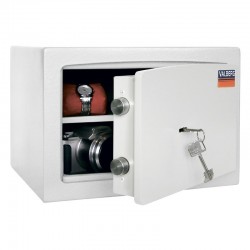
A safe is a long-term investment that isn't changed every few years, so it's important to choose the right safe from the start, one that will meet your needs and reliably serve you for many years. But what are the criteria to consider in order to find the most suitable safe?
Electronic or mechanical: Each of these types of safes has its pros and cons.
A safe with a mechanical lock is resistant to high humidity in rooms as well as low temperatures, and it doesn't require batteries. If the safe is used by multiple people, keep in mind that duplicate keys will need to be made (unless it's a mechanical safe with a mechanical combination key), and you'll also need to think about a secure place to store the safe key.
A safe with an electronic lock is very convenient to use since you only need to remember its code, which you can also entrust to others who will use the safe. This type of safe saves you the worry of hiding or losing keys. Note that electronic safes are more sensitive to high humidity and require periodic battery replacement.
Size of the safe: Size is one of the main criteria to consider when purchasing a safe. A smaller safe usually means a lower price, but people often regret buying a safe that's too small when they start using it and realize how much they want to store in it.
A small safe is suitable if you only need to store a few items daily - such as cash savings, jewelry, important documents (like passports), stamps, and other small items.
A medium-sized safe is the most popular choice as it can accommodate jewelry boxes, cash, document folders without needing to fold them, and other items.
A large safe should be a carefully considered purchase because it's large, heavy, and takes up a significant amount of space. Such safes are suitable for storing large firearms (such as hunting rifles) and document folders, as well as other specific needs.
Before buying a safe, it's recommended to gather the items you plan to store in it. Measure the pile of items with a tape measure and add a small margin. This will give you an approximate idea of the volume of safe you need.
Price of the safe: Cheap safes are lightweight, their bolts and locks are fairly easy to break, and their walls and doors are thin, so they mainly save money but don't provide peace of mind about the security of stored items. When buying a safe, consider that it's a long-term investment and the safety of stored items depends on its quality. The Safe and Cosy portal has calculated that a good small-sized safe costs an average of €300, a medium-sized safe around €600, and a large-sized safe starting from €1200. (However, the specific features of the safe should also be taken into account as they significantly affect the price of the safe.) It's advisable to buy a safe from a reputable brand that also provides servicing.
Fire resistance: Is it important for the safe to be fire-resistant when purchasing it for home use? Our answer is "Yes!" It's important for your belongings to be protected not only from thieves but also from fire accidents - that's what most people who buy safes for home use want.
In a fireproof safe, birth certificates, passports, cash, securities, insurance documents, important bills, USB flash drives, external hard drives, valuables, and other items are usually stored.
When choosing a safe, remember that there's no one best safe. There's only the one that's most suitable for your desires and needs, but also keep in mind the above recommendations so that you won't regret your choice in the future.










































































